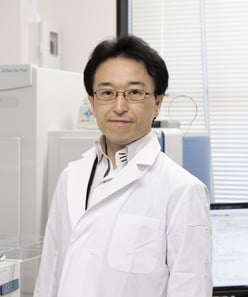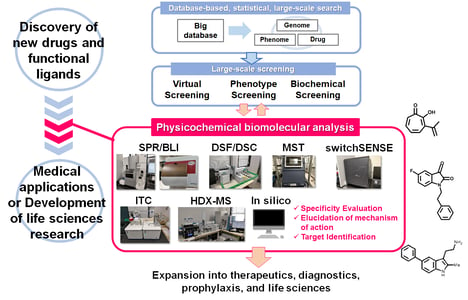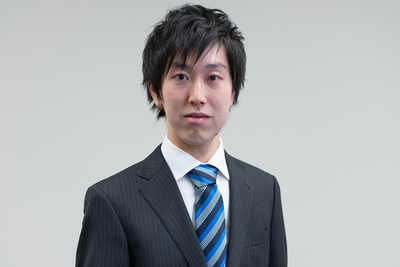Young Faculty / 063
Project Associate Professor Satoru Nagatoishi, Tsumoto Laboratory, Department of Bioengineering and The Institute of Medical Science

<Biography>
(Education)
Mar, 2004 : Department of Materials Science and Engineering, School of Engineering, Kyushu University
Mar, 2006 : Department of Chemistry and Biochemistry, Graduate School of Engineering, Kyushu University
Mar, 2009 : Graduate School of Frontier Sciences, The University of Tokyo
(Research History)
Apr, 2007 : Research Fellowship for Young Scientists, Japan Society for the Promotion of Science
Apr, 2009 : Assistant Professor, Frontier Institute for Biomolecular Engineering Research, Konan University
Apr, 2012 : Assistant Professor, The Institute of Medical Science, The University of Tokyo
Apr, 2013 : Assistant Professor, School of Engineering, The University of Tokyo, (Concurrent), Drug Discovery Initiative, The University of Tokyo
Apr, 2017 – Present : Project Associate Professor, The Institute of Medical Science, The University of Tokyo, (Concurrent), School of Engineering, The University of Tokyo
Dec, 2021 – Present : (Concurrent) Adjunct Project Leader, National Institutes of Biomedical Innovation, Health and Nutrition
<About the Research>
Our life is based on the intricate workings of biomolecules. Furthermore, their functions are complex. Various functional biomacromolecules (proteins, nucleic acids, etc.) have been discovered, and their relationships with development, differentiation, life support, aging, and disease have become clear. Accordingly, the functional regulation of these biomacromolecules is also linked to the treatment and promotion of a healthy lifespan. Much of the research into the control of these functions has focused on the "clear structures" of biomolecules and the design of functional ligands with "high activity (high binding affinity and specificity). However, in our cell systems, many "low binding affinity, unclear molecular recognition and structure" also play essential functions and are responsible for the molecular order among biomolecules in our body. The technology to control these biomolecules and the design of control molecules are still in limbo. I am engaged in creating new functional ligands and developing technologies to control the order of such biomolecules.

(1) Creation of specific small-molecule ligands based on physicochemistry
The use of small-molecule ligands to control biological activities is not only expected to deepen our understanding of cellular systems, but also to be applied to medical and diagnostic applications. The development of small-molecule ligands that specifically regulate proteins in vivo has generally focused on high affinity as an indicator. Physicochemical properties of the binding mode have not yet received much attention in the search step. Capturing thermodynamic and kinetic properties can be important indicators in creating specificity in ligand binding. What kind of small-molecule ligands can be created by screening based on physicochemical indicators without focusing on high affinity? Are there any gemstones that show attractive activity even in low-affinity compounds? In this study, I am targeting proteins related to serious diseases and proteins of pathogenic microorganisms, using a small-molecule compound library to select small-molecule compounds that show inhibitory activity using physicochemical methods, and attempting to discover and design small-molecule ligands with novel mechanisms of functional regulation that show activity in model cells and model mice.
(2) New molecular recognition understanding of biomacromolecules for medical applications
Biomolecules have many advanced functions that artificial molecules cannot yet achieve. Among them, biomolecules that interact with relatively low binding affinity, exhibit molecular recognition that exhibits multiple specificities, and perform functions in an obscure conformational state, are thought to perform important functions and are responsible for the order among molecules in our body. Understanding this function from a physicochemical perspective will lead to the design of new molecules. On the other hand, the remarkable development of computational science in recent years, when combined with physicochemical analysis, will enable even more rational and precise design of functional molecules. Therefore, we would like to propose a guideline for designing new functional molecules with medical applications (expansion of modality) by incorporating computational science to physicochemically elucidate unique molecular recognition in biomacromolecules, which has not yet been elucidated.
<Future Aspirations>
So far, I have been working on the functional elucidation of biological macromolecules related to drug development, and the exploration and design of their regulatory molecules, mainly from a physicochemical perspective. From now on, I would like to create new functional molecules for use in daily life to extend healthy life expectancy, provide more secure living spaces, and promote mutual aid in local communities.
<URL>
Tsumoto Laboratory : http://park.itc.u-tokyo.ac.jp/phys-biochem/
Researchmap : https://researchmap.jp/ngtoishi
You May Also Like
These Related Stories

Young Faculty : Associate Professor Eri Itoh

Young faculty : Associate Professor Takuji Narumi

